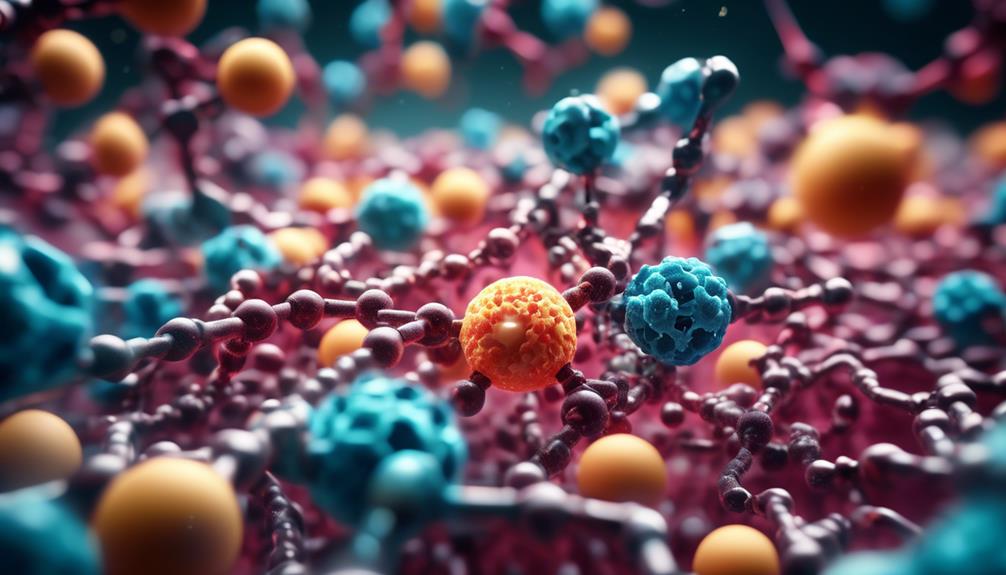Are you tired of trying every fad diet out there, only to be left disappointed and still carrying those extra pounds?
Well, what if I told you that there is a way to achieve weight loss on a whole new level? Tracking macros and calories for keto weight loss may just be the solution you've been searching for.
But why is it so important?
Well, let's explore the science behind it and uncover the secrets to successfully shedding those unwanted pounds.
The Science Behind Keto Weight Loss

To understand the science behind keto weight loss, it's essential to grasp the metabolic process that occurs when following a ketogenic diet. This diet relies on a state called ketosis, where the body switches from using glucose as its primary fuel source to using ketones derived from fat. When you consume a low-carbohydrate, high-fat diet, your body depletes its glycogen stores and begins breaking down fat for energy. This metabolic shift is driven by the impact of macronutrient ratios. By significantly reducing your carbohydrate intake and increasing your fat intake, you force your body into ketosis.
Understanding the ketosis mechanisms is crucial for keto weight loss success. When your body is in ketosis, it becomes efficient at burning fat for fuel, leading to weight loss. Additionally, ketones have a satiating effect, which can help control your appetite and reduce calorie intake. Moreover, the ketogenic diet has been shown to improve insulin sensitivity and regulate blood sugar levels, making it beneficial for individuals with diabetes or prediabetes.
Understanding Macronutrients and Calories
Understanding the role of macronutrients and calories is essential for effective weight management on a ketogenic diet. The macronutrient breakdown of a keto diet typically consists of high fat, moderate protein, and low carbohydrate intake. By tracking your macronutrient intake, you can ensure that you're consuming the right balance of fats, proteins, and carbohydrates to achieve and maintain ketosis, which is the metabolic state where your body burns fat for energy instead of carbohydrates.
Calorie counting, on the other hand, helps you monitor your overall energy intake. When it comes to weight loss, consuming fewer calories than your body needs can create a calorie deficit, leading to fat loss. By tracking your calorie intake, you can assess whether you're consuming an appropriate amount for your weight loss goals.
Customizing Macros for Your Body

Customizing macros for your body involves tailoring your macronutrient intake to meet your specific needs and goals. While the basic principles of the ketogenic diet remain the same for everyone, the exact macronutrient ratios may vary depending on factors such as your weight, height, age, activity level, and overall health.
An individualized approach to customizing macros is crucial because it allows you to optimize your results and ensure that you're getting the right balance of nutrients. For example, if your goal is to lose weight, you may need to adjust your protein intake to preserve lean muscle mass while promoting fat loss. On the other hand, if you're looking to build muscle, you may need to increase your protein intake to support muscle growth and recovery.
To determine your ideal macronutrient ratios, it's recommended to use a macronutrient calculator or seek guidance from a registered dietitian or nutritionist. These professionals can help you assess your individual needs and create a personalized plan that takes into account your specific goals, preferences, and lifestyle.
Tracking Macros to Achieve Ketosis
To achieve ketosis, it's important for you to track your macros. Tracking macros allows you to monitor your intake of carbohydrates, fats, and proteins, ensuring that you stay within the optimal range for ketosis.
By consistently tracking your macros, you can ensure that your body is in the right metabolic state to burn fat for fuel.
Additionally, tracking calories alongside macros can provide further insight into your energy balance and support your weight loss goals.
Importance of Macro Tracking
Tracking your macros is crucial for achieving ketosis and maximizing your weight loss on the keto diet. By monitoring your macronutrient intake, you can ensure that you're consuming the right balance of fats, proteins, and carbohydrates to maintain ketosis.
The role of tracking in weight loss can't be overstated, as it allows you to have a clear understanding of your calorie intake and the impact of macro ratios on ketosis. When tracking your macros, it's important to focus on consuming high amounts of healthy fats, moderate amounts of proteins, and minimal carbohydrates.
This helps your body to switch from using glucose as its primary energy source to burning fat for fuel, leading to weight loss and improved metabolic health. By tracking your macros, you can stay on track and optimize your keto weight loss journey.
Achieving Ketosis Through Tracking
To achieve ketosis through tracking, it's essential to closely monitor your macronutrient intake. Tracking macros allows you to determine the exact amount of carbohydrates, protein, and fat you consume, ensuring you stay within the recommended ranges for a ketogenic diet.
By accurately tracking your macros, you can optimize your body's transition into ketosis, a metabolic state where your body burns fat for fuel instead of carbohydrates. Achieving and maintaining ketosis offers numerous benefits, such as increased weight loss, improved mental clarity and focus, enhanced energy levels, and reduced inflammation.
However, tracking accuracy is crucial for success. Even small deviations from your macronutrient targets can hinder ketosis and prevent you from reaping the full benefits of the ketogenic diet. Therefore, tracking your macros diligently is key to achieving and sustaining ketosis for optimal results.
Benefits of Calorie Tracking
By closely tracking your macros and calories, you can optimize your body's ability to achieve and maintain ketosis for optimal weight loss and overall health benefits.
Calorie tracking allows you to have a better understanding of your energy intake and expenditure, ensuring that you create a calorie deficit necessary for weight loss. It helps you stay accountable and make informed choices about your food consumption.
Additionally, tracking macros is crucial for a successful ketogenic diet. It ensures that you're consuming the right balance of fats, proteins, and carbohydrates to maintain ketosis. By monitoring your macronutrient ratios, you can ensure that you're getting enough fat to fuel your body and maintain ketosis while also meeting your protein needs.
Balancing Macronutrients for Optimal Results
Achieving optimal results on a keto diet involves maintaining a careful balance of macronutrients. Customizing your macronutrient intake is essential for success. Tracking your progress allows you to make adjustments as needed and ensures that you stay on track.
Macronutrients, also known as macros, are the three main nutrients that make up our diet: carbohydrates, fats, and proteins. Each of these macronutrients plays a crucial role in our body's functioning. When it comes to a keto diet, the goal is to consume a high amount of healthy fats, a moderate amount of protein, and a low amount of carbohydrates.
By customizing your macronutrient intake, you can tailor your diet to meet your specific needs and goals. For example, if your primary goal is weight loss, you may want to increase your fat intake to promote satiety and decrease your carbohydrate intake to encourage ketosis.
Tracking your progress is essential to ensure that you're maintaining the appropriate balance of macronutrients. By monitoring your intake, you can identify any potential imbalances and make adjustments as necessary. This can help you optimize your results and ensure that you're staying on track with your keto diet.
Adjusting Caloric Intake for Weight Loss

Adjusting your caloric intake is crucial for weight loss on a keto diet. While following a low-carb, high-fat diet can lead to initial weight loss, your progress may eventually plateau. This is where adjusting your caloric intake becomes essential to continue losing weight. Here are three key reasons why you need to pay attention to your caloric intake on a keto diet:
- Breaking through a weight loss plateau: As you lose weight, your body's energy needs decrease. By adjusting your caloric intake, you can create a calorie deficit necessary for continued weight loss. This involves reducing your daily calorie intake or increasing physical activity.
- Preventing overeating: While a keto diet encourages high-fat foods, it's important to remember that calories still matter. Adjusting your caloric intake ensures that you're not consuming more calories than your body needs, which can hinder weight loss.
- Promoting long-term weight maintenance: Once you reach your weight loss goals, adjusting your caloric intake helps you transition into a maintenance phase. By finding the right balance between calories consumed and calories burned, you can prevent weight regain.
Monitoring Macros for Nutrient Balance
To ensure optimal nutrient balance while following a keto diet, it's important to monitor your macros. Monitoring macros involves tracking your intake of carbohydrates, protein, and fat to ensure you're getting the right balance of nutrients. This is crucial because the keto diet relies on a high fat intake, moderate protein intake, and minimal carbohydrates to induce ketosis, a metabolic state where your body burns fat for fuel instead of glucose.
By monitoring your macros, you can ensure that you're getting enough fat to meet your energy needs and maintain ketosis. It also allows you to adjust your protein intake to support muscle growth and repair. Additionally, tracking your carbohydrate intake helps you stay within the recommended range to maintain ketosis and avoid blood sugar spikes.
Nutrient timing is another important aspect of monitoring macros. By strategically planning your meals, you can ensure that you're consuming the right nutrients at the right times to support your goals. For example, consuming carbohydrates before and after workouts can help fuel your exercise and aid in muscle recovery.
Meal planning is a helpful tool for monitoring macros and achieving nutrient balance. By planning your meals in advance, you can ensure that you're meeting your macronutrient goals and getting a variety of nutrient-dense foods. This can help prevent nutrient deficiencies and support overall health and well-being.
Avoiding Common Keto Mistakes

Avoiding common keto mistakes is essential for successful weight loss and maintaining a state of ketosis. To help you on your keto journey, here are some tips for successful keto weight loss:
- Avoiding excessive protein: One of the most common keto misconceptions is that you can eat unlimited amounts of protein. However, consuming too much protein can actually kick you out of ketosis. It's important to find the right balance between protein and fat.
- Staying hydrated: Drinking enough water is crucial on the keto diet. Dehydration can lead to electrolyte imbalances and hinder your weight loss progress. Aim for at least 8 cups of water per day, and consider adding electrolyte-rich foods or supplements to your diet.
- Being mindful of hidden carbs: Many people overlook hidden carbs in foods, such as sauces, dressings, and condiments. These hidden carbs can add up and prevent you from reaching ketosis. Always read labels and track your carb intake accurately.
Fine-Tuning Macros for Plateau Breaking
To break through a weight loss plateau on keto, you need to fine-tune your macros.
Adjusting your macronutrient ratios can help kickstart your metabolism and encourage further progress.
Macro Adjustments for Progress
Looking to break through a weight loss plateau on keto? Need to fine-tune your macros for optimal progress? Adjusting your macros can be the key to jumpstart your weight loss journey.
Here are three reasons why macro adjustments are crucial for progress:
- Maximize fat burning: By adjusting your macros, you can optimize your body's ability to burn fat for fuel, leading to increased weight loss.
- Ensure adequate nutrient intake: Fine-tuning your macros allows you to ensure you're getting the right balance of nutrients, such as protein, fats, and carbohydrates, to support your weight loss goals while maintaining overall health.
- Overcome plateaus: Adjusting your macros can help you break through weight loss plateaus by challenging your body and preventing it from adapting to your diet.
Breaking Weight Loss Plateaus
To overcome weight loss plateaus on the keto diet, it's crucial to fine-tune your macros by adjusting the ratios of protein, fats, and carbohydrates in your diet. Plateau breaking strategies are essential for overcoming weight loss stalls and continuing progress on your keto journey.
One effective strategy is to reduce your carbohydrate intake further, as too many carbs can hinder ketosis and stall weight loss.
Another approach is to increase your protein intake, as protein helps boost metabolism and promote muscle growth, which can aid in breaking through plateaus.
Additionally, adjusting your fat intake can also be beneficial. Increasing healthy fats, such as avocados and nuts, can help increase satiety, while reducing fat intake can create a calorie deficit and kick-start weight loss again.
Experimenting with these macro adjustments can help you overcome plateaus and achieve your weight loss goals on the keto diet.
Tracking Progress and Adjusting Macros
You can track your progress and make adjustments to your macros, if desired, to optimize your keto weight loss journey. Tracking your progress is essential because it allows you to monitor your results and make informed decisions about your diet. Here are three reasons why tracking progress and adjusting macros can be beneficial:
- Identify patterns and trends: By tracking your food intake and weight loss progress, you can identify patterns and trends. This information can help you understand what works best for your body and make adjustments accordingly.
- Ensure you're in ketosis: Tracking your macros can help ensure that you're in a state of ketosis. By monitoring your carbohydrate, fat, and protein intake, you can adjust your macros to stay in ketosis and maximize your weight loss.
- Fine-tune your approach: Tracking your progress allows you to fine-tune your approach. If you notice that you're not losing weight as expected, you can adjust your macros by increasing or decreasing your calorie intake or modifying your macronutrient ratios.
Conclusion
In conclusion, tracking macros and calories for keto weight loss is like navigating the intricate pathways of a garden. By understanding the science behind keto weight loss, customizing macros for your body, and monitoring nutrient balance, you can achieve optimal results.
Avoiding common mistakes and fine-tuning your macros when hitting plateaus will keep you on the right path.
So, grab your tracker and embark on this journey towards a healthier, fitter you.






